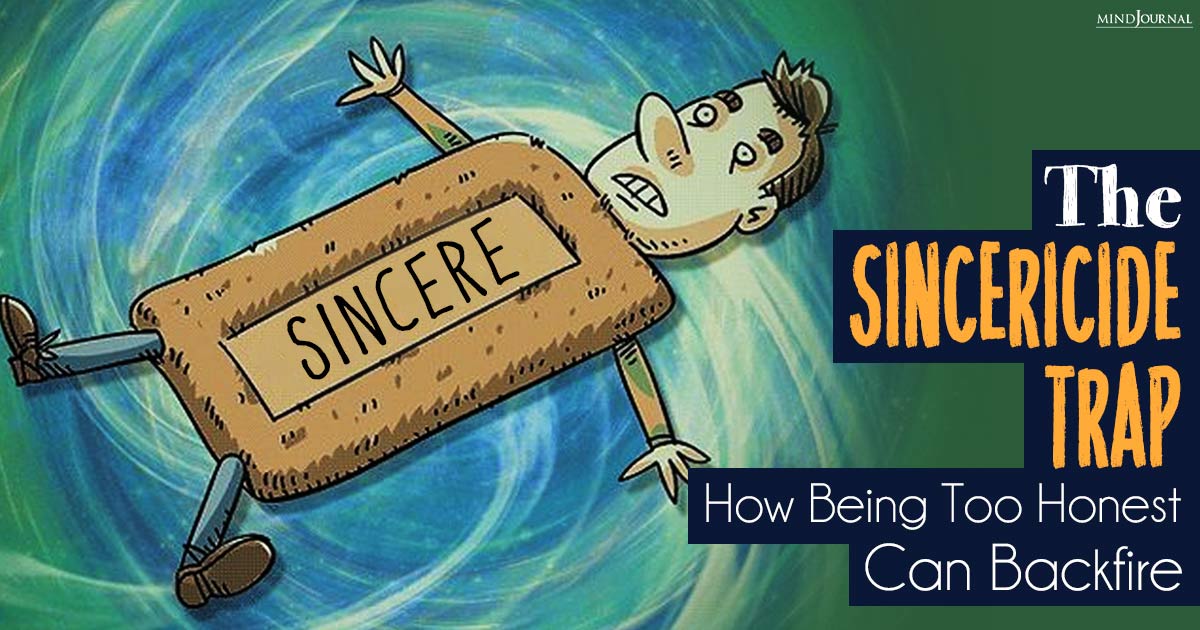In the realm of human interaction, truthfulness is often described as a virtue—a foundation of trust and authenticity. However, there’s a phenomenon called “sincericide,” which denotes the paradoxical act of undermining one’s own sincerity.
Honesty is appreciated, but the idea of “Sincericide” – an oxymoronic pitfall that may lead to undesirable results through too much sincerity.
Trust is built on transparency but it’s also important to know how not to cross the line between being frank and rude.
In this article, we’ll discuss ‘Sincericide’, the secret killer of strong relationships — telling the truth without sugarcoating it. How do you communicate honestly without destroying your relationship?

Sincericide: What Does It Mean?
Although sincericide is not recognized by conventional language or psychology, it can be seen as a blend of ‘sincerity’ and ‘-cide’ meaning the killing or destruction of sincerity.
Fundamentally, sincericide reflects the clash between genuineness and social peace. This happens when people suppress their real thoughts, feelings or beliefs out of fear, societal demands or need for conformity.
Such suppression usually leads to feigning compliance where truthfulness is sacrificed on the altar of fitting in.
Related: The Burnt Toast Theory: 5 Lessons To Learn From Unpredictability In Life
The Dangers Of Being Too Honest
1. Unintended Results
When people are too honest, they may not think about the consequences before expressing themselves. This absence of filter can unintentionally hurt friends or offend them due to being insensitive.
2. Perceived as Harshness
In a world that runs on diplomacy, unreserved truthfulness can be seen as harshness or confrontation. Such view might catalyze rage or bitterness from individuals who would rather hear kinder lies hence making socializing more complex.
3. Fear of Displeasing Others
The dread of displeasing others while striving to fit in can lead a person towards self-destruction. Such fear requires one to moderate their bluntness so as not to break ties with friends and other people around them.
4. Estrangement With Friends
People who tend to tell the truth too much might lose their friends because they are not careful with words or how others feel. Therefore, this may result in one being lonely as relationship damages caused by straight forwardness.
5. Work Relationship Strain
Being excessively honest in workplaces also has its share of problems. For instance, colleagues and bosses could brand someone who is always candid as disruptive or lacking tact thus blocking such an individual’s promotion chances besides causing friction among employees.
Walking On A Razor Blade: How To Stop Being Too Honest?
Avoiding sincericides demands careful balancing act characterized by subtle interactions between veracity and discretion; here are some tips on how to stop being too honest.
1. Show Empathy And Emotional Intelligence
Before letting loose with all guns blazing, pause for moment to think about what other people may be feeling or thinking.
Develop empathy and emotional awareness so as to package your message in manner that resonates with the audience thereby fostering deeper comprehension.
2. Be Selective About Honesty Battles
Not every battle is worth dying for therefore differentiate between areas that call for total honesty and those which require some level of tact. Give priority to uprightness in matters touching on integrity but show restraint where emotions run high or when little is at stake.
3. Foster Diplomacy And Tactfulness
Bluntness shouldn’t always be equated to truth hence mastering art diplomacy enables one speak hard facts without necessarily hurting others.
Use constructive criticism plus offering solutions can help reduce impact associated with being too direct while still creating room for openness through collaboration.
4. Embrace Vulnerability And Authenticity
Authentic connections are realized through genuine expression of self thus making vulnerability an integral part these bonds. Let sincerity shine as strength that attracts trust from others who themselves may have experienced similar situations.
5. Personal Reflections Alongside Establishing Boundaries
Know yourself. What do you really want when you’re honest — validation, clarity or connection? In order to preserve your truthfulness without self-destruction, establish helpful boundaries because preserving oneself is not another word for lying.
Honesty and sincerity are like beacons in the night of human interaction; they guide us to deeper connections and more genuine relationships. But what if it’s ourselves that we have to watch out for?
We can tilt the balance in favor of candor over social peace by adopting empathy, tact and openness as our navigational tools through this minefield.
Related: How Being Too Nice Makes Your Life Miserable
To put it simply, we should strive towards fostering genuine communication without killing off its foundations. Just remember that being sincere means being true to yourself when everything around insists otherwise.










Leave a Reply